The AMD Zen and Ryzen 7 Review: A Deep Dive on 1800X, 1700X and 1700
by Ian Cutress on March 2, 2017 9:00 AM ESTBenchmarking Performance: CPU System Tests
Our first set of tests is our general system tests. These set of tests are meant to emulate more about what people usually do on a system, like opening large files or processing small stacks of data. This is a bit different to our office testing, which uses more industry standard benchmarks, and a few of the benchmarks here are relatively new and different.
PDF Opening
First up is a self-penned test using a monstrous PDF we once received in advance of attending an event. While the PDF was only a single page, it had so many high-quality layers embedded it was taking north of 15 seconds to open and to gain control on the mid-range notebook I was using at the time. This put it as a great candidate for our 'let's open an obnoxious PDF' test. Here we use Adobe Reader DC, and disable all the update functionality within. The benchmark sets the screen to 1080p, opens the PDF to in fit-to-screen mode, and measures the time from sending the command to open the PDF until it is fully displayed and the user can take control of the software again. The test is repeated ten times, and the average time taken. Results are in milliseconds.
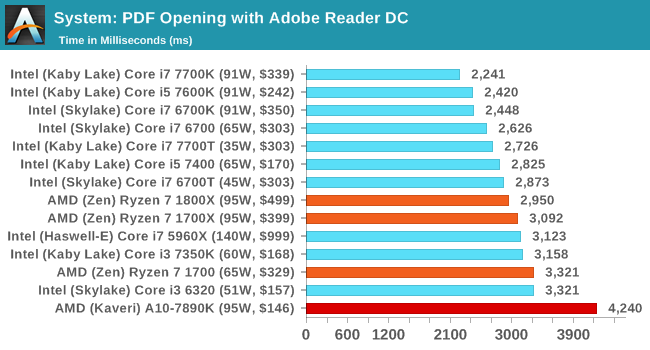
FCAT Processing
One of the more interesting workloads that has crossed our desks in recent quarters is FCAT - the tool we use to measure stuttering in gaming due to dropped or runt frames. The FCAT process requires enabling a color-based overlay onto a game, recording the gameplay, and then parsing the video file through the analysis software. The software is mostly single-threaded, however because the video is basically in a raw format, the file size is large and requires moving a lot of data around. For our test, we take a 90-second clip of the Rise of the Tomb Raider benchmark running on a GTX 980 Ti at 1440p, which comes in around 21 GB, and measure the time it takes to process through the visual analysis tool.
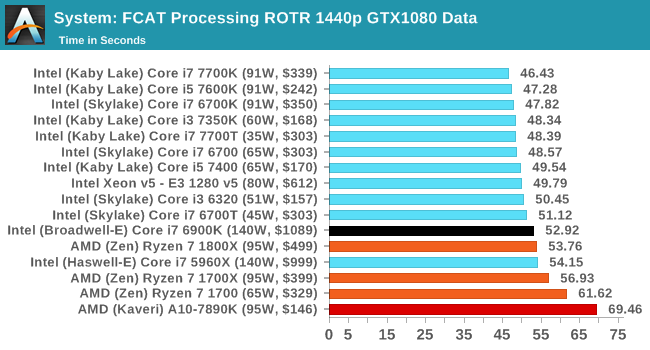
3D Particle Movement v2.1
This is the latest version of the self-penned 3DPM benchmark. The goal of 3DPM is to simulate semi-optimized scientific algorithms taken directly from my doctorate thesis. Version 2.1 improves over 2.0 by passing the main particle structs by reference rather than by value, and decreasing the amount of double->float->double recasts the compiler was adding in. It affords a ~25% speed-up over v2.0, which means new data.
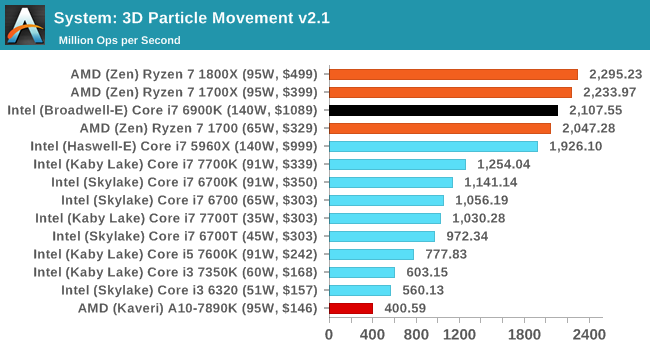
DigiCortex 1.16
Despite being a couple of years old, the DigiCortex software is a pet project for the visualization of neuron and synapse activity in the brain. The software comes with a variety of benchmark modes, and we take the small benchmark which runs a 32k neuron/1.8B synapse simulation. The results on the output are given as a fraction of whether the system can simulate in real-time, so anything above a value of one is suitable for real-time work. The benchmark offers a 'no firing synapse' mode, which in essence detects DRAM and bus speed, however we take the firing mode which adds CPU work with every firing.
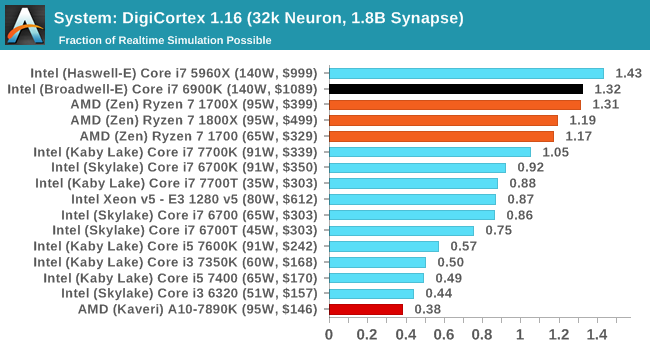
Agisoft Photoscan 1.0
Photoscan stays in our benchmark suite from the previous version, however now we are running on Windows 10 so features such as Speed Shift on the latest processors come into play. The concept of Photoscan is translating many 2D images into a 3D model - so the more detailed the images, and the more you have, the better the model. The algorithm has four stages, some single threaded and some multi-threaded, along with some cache/memory dependency in there as well. For some of the more variable threaded workload, features such as Speed Shift and XFR will be able to take advantage of CPU stalls or downtime, giving sizeable speedups on newer microarchitectures.
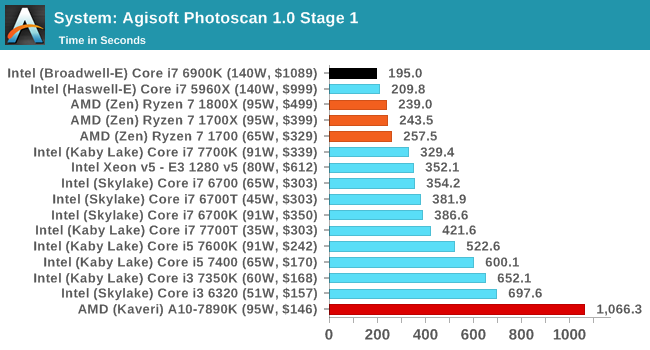
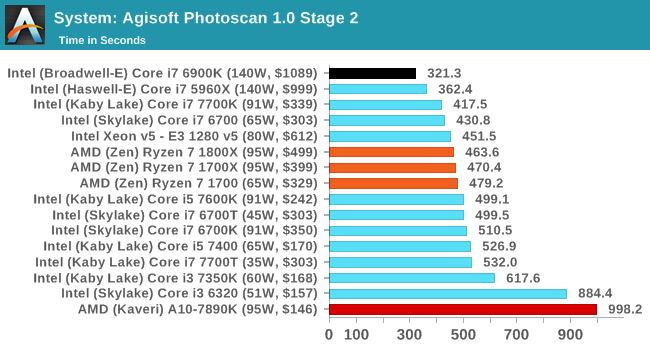
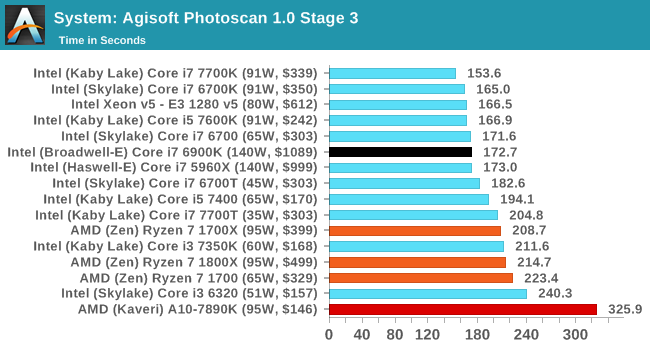
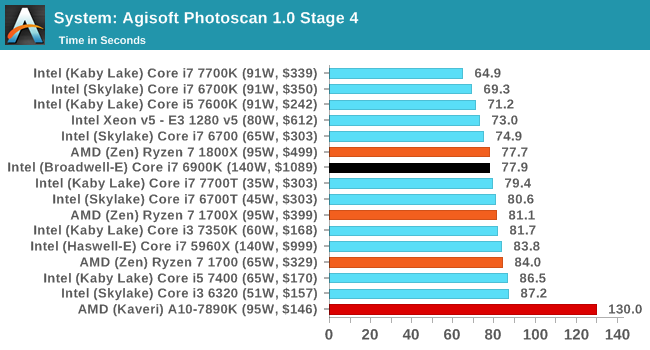
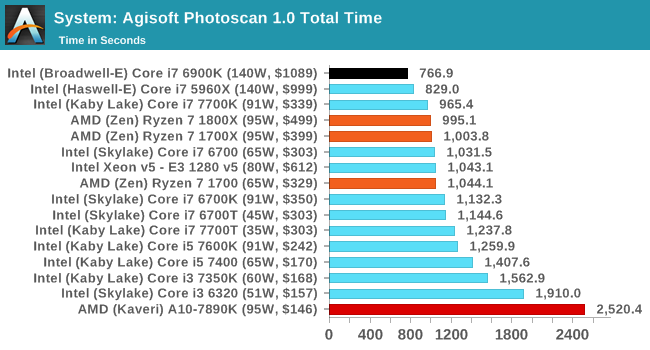










574 Comments
View All Comments
rudolphna - Thursday, March 2, 2017 - link
Demonizing gamers in your post does nothing to contribute to your credibility, and will only turn off more well reasoned people from listening, or caring, about your opinion.samer1970 - Friday, March 3, 2017 - link
Gamers dont buy 8 cores chips .. If you want good AMD gaming chip at very low price , wait for the 6 and 4 cores Ryzen and then judge ...I expect the 4 cores/8 threads Ryzen at 150$ to blow Intel to pieces ... SOON ..
Imagine a 4.5Ghz AMD Ryzen 4 cores for $150 then talk .
Sttm - Friday, March 3, 2017 - link
4 cores that are noticeably slower than Intel's 4 cores, which sell in a handsome i5 package for $200. I think they need a software miracle and they need it fast to win over the gaming crowd.Cooe - Sunday, February 28, 2021 - link
Bet you're feeling like a massive idiot now if you actually got that 4c/4t Kaby Lake i5 over a 6c/12t Ryzen 5 1600. It was about as fast at 1080p gaming in 2017 as the R5, but nowadays isn't even in the same UNIVERSE as the Ryzen chip. Let alone the performance difference for literally EVERYTHING else.Diji1 - Thursday, March 2, 2017 - link
Hurr durr you don't like what I like so you're a dumbo making me smarter than you! (yes, I know but they cannot see it themselves because their so smart in their own imagination).JoeyJoJo123 - Thursday, March 2, 2017 - link
What exactly are you trying to say here?Holliday75 - Thursday, March 2, 2017 - link
I think it was "Hurr durr".BikeDude - Friday, March 3, 2017 - link
sounded more like 'hold door' to me?star-affinity - Thursday, March 2, 2017 - link
I didn't know what is considered "wasting your life" is objective – please elaborate. What do you do with your life that makes it better than someone who likes to plays RPGs?Dug - Friday, March 3, 2017 - link
I'm so glad you are the one to judge what people are when they play games. Your insight and thought process is inspiring.I'm only to guess that what you do with a computer is going to change the world.